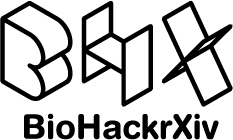guide.biohackrxiv.org
Guidelines for BioHackrXiv, an OSF preprint server for BioHackathon-like events in Life Sciences
Submission guidelines

Before submitting
BioHackrXiv welcomes articles corresponding to an original work and derived from projects proposed and developed as part of a BioHackathon, CodeFest, VoCamps, Sprint or similar in the domain of Life Sciences. We require the first, last or corresponding author to have participated in the event. More information can be found on our Journal policies and our Moderation process.
Where can I get a publication example?
- If you want to see an “before-submission” example, you can have a look at the Markdown and bibliography files corresponding to the generated PDF of the paper “Logic group paper from NBDC/DBCLS BioHackathon 2019”.
- If you want to see a published example, you can have a look at the BioHackrXiv example paper.
Formatting and style
- Format of the manuscript: by now only Markdown coverted to PDF with our PDF preview service or generator tool
- Length: we suggest up to 10 pages including references
- Images and tables: we do not require images or tables as a separate file, they should be embedded in the main manuscript. We do ask you to make sure the information there is readable
- Footnotes: Not permitted
- Language: English (American or British spelling are accepted but do not mix them up)
- Abbreviations/acronyms: Define them as they appear first in the manuscript
- References: Preferably papers published or in press. If you want to cite web pages, please use the Markdown syntax for links (so they are visible in the text) but also include them as a reference (so authors/owners are credited by their work); whenever possible add an author and a publication date and always add the day you visited the page. If you are citing a web page corresponding to software or data, whenever possible add also the corresponding version. Your references will be converted to the ‘Harvard’ style by our PDF generator
Sections
- Abstract (we suggest a maximum of 300 words) and keywords (we recommend at least three) are required
- We suggest having the following sections.
- Introduction or background
- Intermediate sections reporting the work done during the event, i.e., BioHackathon, CodeFest, VoCamp, Sprint or similar
- Discussion
- Conclusions
- Future work
- Links to software (e.g., GitHub or Jupyter Notebooks) and data repositories created or developed during the event
- Acknowledgements, make sure you always acknowledge the event where the reported work was developed and/or advanced
- References
- Supplementary material is optional. If you want to faciliate text-minning tasks, please submit the PDF corresponding sources, i.e., Markdown, bibliography and figures, as supplementary material.
While preparing your submission
- To prepare your manuscript please use the Markdown template, e.g. by cloning this repository.
- Please remember to get the approval of all listed co-authors before submitting.
- Please remember to properly credit any third-party material you are using.
- Once your manuscript is ready please use our PDF generator tool, you will find there instructions on how to use it and how to report issues.
- Once your PDF has been generated, you are ready to submit!
When ready to submit
- Please go to the submission portal to share your article.
- You will need to sign in to access the submission system.
- Fill in the provided form, remember to upload a PDF file created with our PDF preview service or generator tool.
- Remember, if you want to faciliate text-minning tasks, please submit the corresponding sources, i.e., Markdown, bibliography and figures, as supplementary material.
- The copyright remains with the author, who can select from several distribution/reuse options, i.e., license.
- Although you can choose from multiple license, we recommend CC-BY or CC0 to facilitate others to build upon your work.
- Regardless of the chosen license, by publishing on BioHackrXiv, authors explicitly consent to text mining of their work (e.g., by search engines or researchers).
- If any of your co-authors is already registered with OSF preprints use the search option to find them or add them by email.
- Submit your paper, it will go then through the moderation process.
After submitting
- Submitted manuscripts go through the moderation process to check basic conformance to the guidelines contained in this document.
- Any articles not conforming to these guidelines will be rejected and submitter will be notified, you can always modify your article an resubmit if you see you can fulfil the preprint requirements, see “Before Submitting” section in this document.
- Please be aware preprints are not peer-review, you as an author carry full responsibility on the information, including but not limited to content, data, tools and references.
- BioHackrXiv takes no responsibility on the material published.
- You can always re-submit an updated version of your preprint. Find your submission on the OSF preprints portal and follow a process similar to the submission one.
- Once a DOI is assigned, preprints become a public record and therefore their metadata must be preserved. Accepted articles can still be withdrawn (i.e., removed) with the approval of the BioHackrXiv steering committee.
- BioHackrXiv reserves the right to identify and retract any articles containing plagiarized material, on copyright infringement or describing experimental work that is not performed in accordance with the relevant ethical standards for research using animals or human subjects.